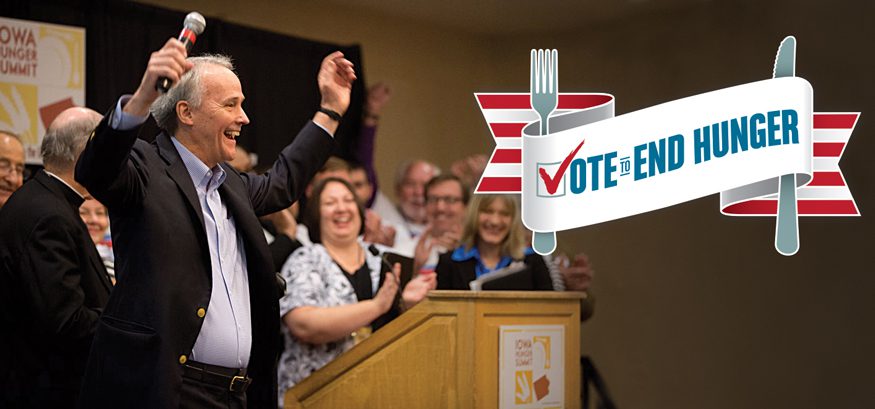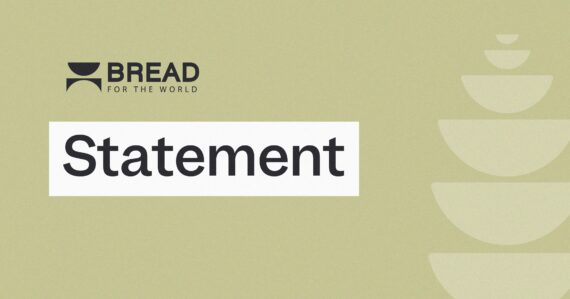[Note: This article appears in Bread’s 2015 November-December newsletter]
By Adlai Amor
Elections matter. And Bread for the World, along with partner organizations, wants to ensure that ending hunger and poverty becomes a high priority for our next president and Congress.
In fact, we want them to take concrete actions that will put our nation and the world on track to end hunger by 2030.
With that goal in mind, the Vote to End Hunger (VTEH), a new coalition, took root last month with a formal launch during the Iowa Hunger Summit in Des Moines. The launch was the highlight of the summit, which culminated with the official presentation of the World Food Prize for 2015 to Sir Fazle Hasan Abed.
But can we really “vote to end hunger”? Approximately 700 hunger activists attending the summit jumped to their feet and cheered loudly that their votes indeed could end hunger.
Bishop Richard Pates, Roman Catholic archbishop of Des Moines, echoed this sentiment at the launch. “Iowa’s first-in-the-nation status gives us the opportunity to bring this issue to the forefront in the 2016 elections,” he said.
Who’s in the coalition?
The VTEH coalition (www.votetoendhunger.org) is being organized by the Alliance to End Hunger, Bread for the World, Feeding America, Meals on Wheels America, RESULTS, and Share Our Strength. VTEH adheres to a set of eight principles, among them “ending hunger is not a partisan issue.”
So far, dozens of organizations and individuals have signed on to the VTEH coalition. On Nov. 8, the four dioceses of the Iowa Catholic Conference, Bread for the World, and Methodist, Lutheran, and Episcopal churches, sponsored a Vote to End Hunger rally at Grand View University. The Des Moines university is affiliated with the Evangelical Lutheran Church in America.
“Throughout the world, countries such as Bangladesh, Ethiopia, and Great Britain have made tremendous strides in reducing hunger. However, in the United States, we have seen little progress because our nation has not made solving hunger a priority,” said Rev. David Beckmann, president of Bread for the World. “We need to vote for leaders who care about ending hunger, so the next president and Congress will work together and solve it.”
In the U.S., 1 out of every 7 households – more than 48 million Americans – struggle to put food on the table. These numbers include 5.4 million older Americans and 15 million children. Around the world, 795 million people experience hunger every day.
Support among the electorate
The growing interest in the VTEH coalition — and other Bread vote-to-end hunger activities — reflects the results of a recent elections survey commissioned by Bread. The survey, conducted by the Eleison/Mellman Groups, found that 6 out of 10 voters surveyed said that ending hunger should be a priority for the government. Nearly 4 in 10 of those surveyed, 39 percent, agreed that a candidate needs to “fight for government funding for anti-hunger programs to earn my vote.”
Among those surveyed, hunger is of most concern when described in the context of children going hungry, veterans needing food stamps, and working families unable to buy enough food. Programs focused on these three groups are perceived to be important and effective.
“We have seen what brinksmanship in Congress has done to those suffering from hunger and poverty in the U.S. and abroad,” said Eric Mitchell, Bread’s director of government relations. “We must make sure that our next set of leaders put ending hunger as one of their top priorities.”
Other election efforts
Bread’s participation in the VTEH coalition is part of our 2016 elections strategy. In last month’s newsletter, we wrote about the presidential videos project being conducted with our partners in the Circle of Protection (www.circleofprotection.us).
Bread staff are now preparing to focus on key congressional districts in Ohio and Florida and preparing resources for all Bread members to use during the elections in their respective districts. The materials will be available at www.bread.org/elections.
The Vote to End Hunger strategy builds on our 2014 work that tested elections strategies in Virginia’s 10th Congressional District. We used on-the-ground canvassing among people of faith, market research, and reaction to local advertising.
“The 2016 elections are critical in ensuring ending hunger is a national priority with the new president and Congress starting in 2017,” said LaVida Davis, Bread’s director of grassroots organizing and capacity building. “I call on all our members to be actively involved in making sure we elect leaders who consider ending hunger a priority.”
As a nonpartisan organization, Bread will not be endorsing any particular candidate or party in the 2016 elections.
Adlai Amor is the director of communications and marketing at Bread for the World.
We need to vote for leaders who care about ending hunger, so the next president and Congress will work together and solve it.



